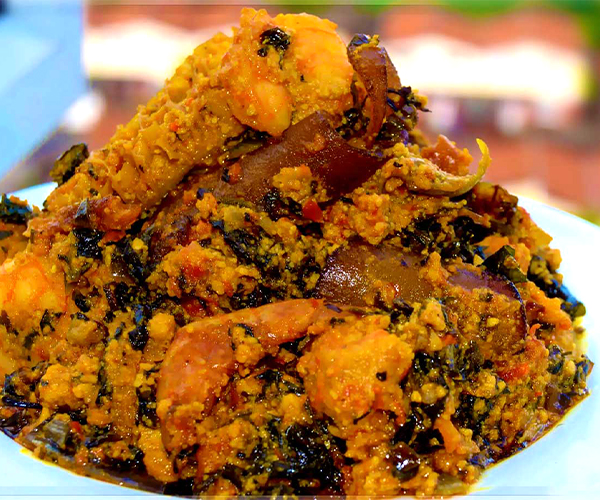Nigeria’s food culture is rich and diverse, with Egusi Soup standing tall as one of the most cherished meals across the country. Known for its creamy texture, rich flavor, and nutritional value, Egusi Soup is more than just food, it’s a symbol of celebration, heritage, and unity.
In this food ascribe, we explore everything about Egusi Soup, its origin, preparation style, cultural importance, and why it remains one of Nigeria’s most iconic soups.
What is Egusi Soup?
Egusi Soup is a traditional Nigerian soup made from ground melon seeds, cooked with palm oil, meats, fish, vegetables, and indigenous spices. The melon seeds, when ground and cooked, create a thick, creamy consistency that blends perfectly with assorted proteins and leafy greens. Egusi Soup is best enjoyed with Nigerian swallows such as Pounded Yam, Eba (garri), Fufu, or Semovita.
Origin of Egusi Soup:
Egusi Soup is believed to have originated from Southern Nigeria, with deep roots among the Igbo, Yoruba, and Edo people. Over the years, it has become a household meal across the country, with each tribe adding its unique touch to the recipe. Though popular nationwide, Egusi holds particular cultural significance among:
✅ The Igbo of Eastern Nigeria
✅ The Yoruba of South-West Nigeria
✅ The Edo and Delta regions
Each region may slightly vary in preparation but the heart of the soup-ground melon seeds remains constant.
Key Ingredients of Egusi Soup:
While variations exist, the core ingredients for a rich Egusi Soup include:
Egusi (Melon Seeds) Ground to form the base of the soup, palm oil, Adds flavor and the signature reddish color, assorted meats, beef, goat meat, cow tripe (shaki), or offals, Dry Fish/Stockfish For depth of flavor, crayfish Adds a native, aromatic taste, leafy Vegetables, Ugu (pumpkin leaves), bitterleaf, or spinach, seasoning cubes and Salt for taste enhancement, ground Pepper and onions For spice and aroma, optional additions include periwinkle, snails, or kpomo (cow skin) based on preference.
Methods of Preparing Egusi Soup:
There are two major popular styles of cooking Egusi Soup:
(1) The Fried Egusi Method (Yoruba Style) Palm oil is heated. Ground egusi and onions are fried gently. Meat stock, assorted proteins, and spices are added. Vegetables are stirred in last for freshness. (Why It’s Special)
It creates a thick, fluffy texture, rich in oil and flavor, loved in Yoruba homes.
(2) The Lumpy Egusi Method (Igbo Style) Ground egusi is mixed with water to form a paste. The paste is added in lumps to boiling stock and left untouched to cook. Meats, fish, and spices follow. Vegetables are added after, maintaining the distinct lumps. (Why It’s Special) The lumps give the soup texture and richness, popular in Igbo cuisine.
Cultural Significance of Egusi Soup:
Egusi Soup is more than just a delicious meal; it carries deep cultural relevance:
✔ Served at weddings, traditional ceremonies, and family gatherings
✔ Symbol of hospitality, often prepared to welcome visitors
✔ Seen as a festive or weekend meal in many homes
✔ Represents abundance due to its rich, thick composition
In many cultures, a well-cooked Egusi Soup reflects a host’s generosity and cooking skills.
Egusi Soup Pairings:
Egusi Soup is enjoyed with various Nigerian swallows:
✅ Pounded Yam, Soft, stretchy, perfect companion
✅ Eba (Garri), Popular, filling, and easy to prepare
✅ Semovita, Smooth texture that complements the soup
✅ Fufu, Traditional fermented cassava swallow
Nutritional Benefits of Egusi Soup:
Aside from its delightful taste, Egusi Soup offers significant health benefits:
Rich in healthy fats from melon seeds, High protein from assorted meats and fish, Vitamins from vegetables, Energy-boosting carbohydrates when paired with swallow, Contains antioxidants from native spices,
Note: Due to the oil content, moderation is advised for those watching fat intake.
Conclusion:
Egusi Soup is a timeless Nigerian delicacy that reflects the country’s love for rich, satisfying meals. Whether fried or cooked lumpy, with meat, fish, or both, Egusi remains a top choice for celebrations, Sunday meals, and special occasions.
Experience the creamy goodness of Egusi Soup today, and embrace the flavor of Nigeria’s diverse culture.
For more authentic Nigerian food ascribes, recipes, and cultural stories, visit usgavenue.com





